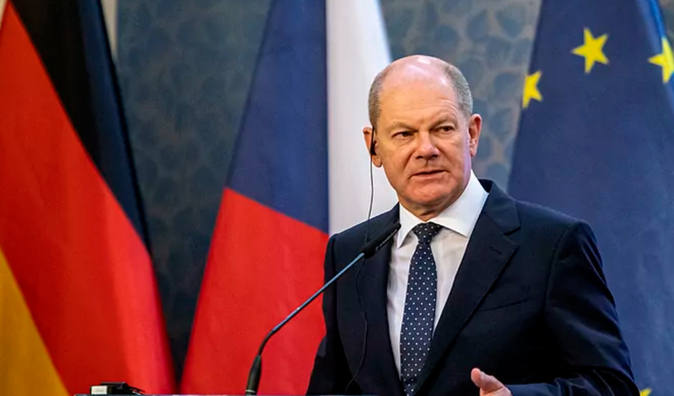Europe Sanctions: the long-term battle against Russia waged by the European Union
The German chancellor, Olaf Scholz, is willing to sacrifice the specific weight of his country in Brussels to take away the blocking capacity of the others in favor of
a European Union of majorities, more dynamic, more sovereign and more prepared
for future enlargements.
That has been the pillar of the Europeanist speech that Scholz has delivered this Monday at the Charles University in Prague, a 60-minute speech closer to the theses of French President Emmanuel Macron than to those of his predecessor, Angela Merkel.
"The EU must advance jointly in the development of its community.
I do not want an EU of clubs or exclusive directions, but an EU of common partners
", assured Scholz when presenting his "ideas and elements of reflection, not prefabricated German solutions" for an EU pushed by the Russian invasion of Ukraine into a new era.
For Scholz,
the community bloc needs "radical reforms"
and among them he highlighted the reorganization of the European Parliament and the abandonment of the principle of unanimity in decision-making, although this entails negative consequences for Germany
"It is important to relax the unanimity principle and allow majority decisions instead, especially in foreign and security policy," said the chancellor, who also
called for more intense cooperation on defense
.
He thus advocated the creation of a fully functioning EU headquarters and offered a central role for Germany in organizing air defense in Northern and Eastern Europe.
"It is important to strengthen the EU's defense capability and establish a joint EU rapid reaction force by 2025," said Scholz, who also favors building a new air defense system together with European neighbors.
"An air defense system developed jointly in Europe
would be more effective and cost-effective than if each of us built our own systems," the German chancellor said, adding that there is "a lot to do" in defense against air threats and spatial.
He announced in this sense that Germany will invest "in a very significant way" in this matter "in the coming years in the design of this future air defense so that our European neighbors can participate if they so wish," he said.
In the EU that Scholz envisions, violations of the fundamental values of the European Union should be easier to bring to the European Court of Justice.
For this reason, he defended the opening of a new path for the Commission
to initiate infringement procedures against the Member States
, including the violation of the fundamental values enshrined in the EU Treaty, such as "human dignity, freedom, democracy, equality, rule of law and respect for human rights".
In addition, Scholz demanded that something be done about blocking possibilities in the rule of law procedure under Article 7 of the EU Treaty.
This provides for the possibility of suspending the voting rights of states that seriously and persistently violate EU values.
Referring to the rule of law conflicts with Poland and Hungary,
Scholz stressed that the EU must not compromise its foundations and values
, which is why it seemed "sensible to him to systematically link payments to compliance with the rules of the rule of law," he said.
Scholz expressly declared himself in favor of a
major enlargement of the EU
, specifically towards the Western Balkan states, Ukraine, the Republic of Moldova and, in the future, Georgia. For Scholz, the dividing line is between a free Europe and a neo-imperial autocracy," stressed
In an obligatory reference to the Russian invasion of Ukraine, the chancellor affirmed that
"an attack on Ukraine is an attack on the European security order"
and in this sense he promised help to defend the country for as long as necessary: "I imagine Germany assuming a special responsibility in the construction of the Ukrainian artillery and air defense," Scholz said.
The chancellor, who has invited together with the EU Commission, a conference for the reconstruction of Ukraine on October 25 in Berlin, called for better coordination of arms aid to Ukraine following the example of the cooperation model launched with the Netherlands.
An initiative aimed at a permanent and reliable division of labor between all Ukraine's partners.
Scholz stressed that
"our goal is to have a modern Ukrainian armed forces
that can defend their country in the long term. However, to achieve this, we must not only supply Kiev with what we ourselves can do without at the moment. What is needed it's more planning and coordination," he stressed.
Scholz called for a very strong and independent EU, also economically.
"European responses to the change of times are needed.
Europe must be more autonomous in critical areas
such as the production of semiconductors," said the chancellor, who proposed a "Made in Europe 2030 strategy", because "compared to Silicon Valley or the Chinese and Japanese suppliers, Europe must fight to get back on top and many raw materials, such as lithium, cobalt or nickel, are available in Europe," he said.
Five years ago, French President Emmanuel Macron - also at a university, the Sorbonne in Paris - delivered a keynote speech in which he called for the "refounding" of a sovereign, democratic and united Europe.
He advocated a common budget for the euro countries, a common EU defense budget and a European intervention force, proposals that at the time triggered contentious debates in the EU, including Germany.
Scholz follows Macron's example and supports the path towards greater integration
.
"The pressure on the EU will increase, regardless of the war in Ukraine," argued Scholz, who completed his first visit to Prague with an interview with his colleague,
Petr Fiala
, who on July 1 took over the rotating Presidency of the EU.
Conforms to The Trust Project criteria
Know more
Ministry of Defence
Ukraine
Europe
Germany
Angela Merkel
European Union
berlin

